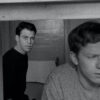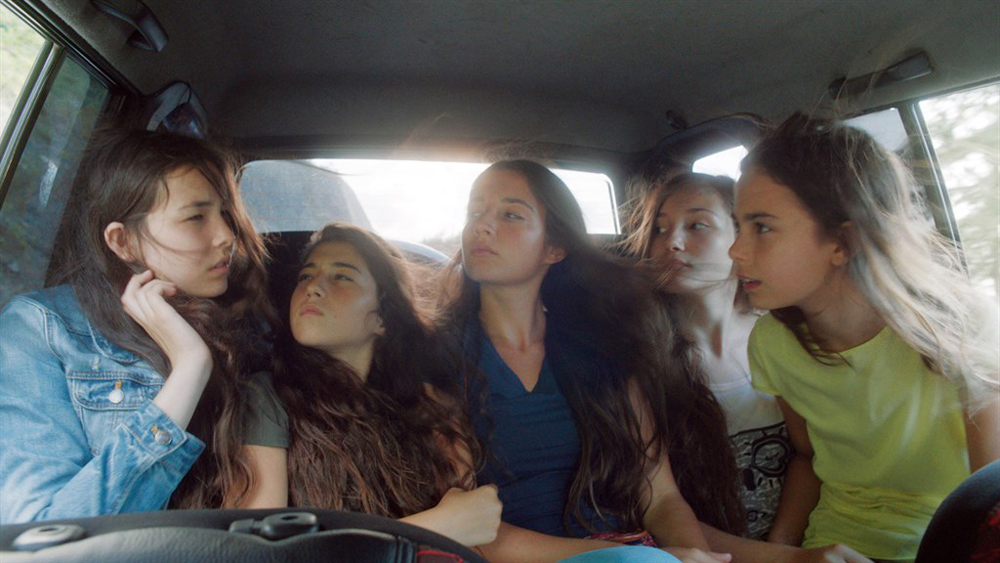Three weeks before production was set to start on “Mustang,” Deniz Gamze Erguven received word that one of the primary financiers of her debut film was dropping out. Another producing partner would come in at the last minute after a nerve-wracking search — Charles Gillibert, a French producer who had seen promise in the story about a group of five Turkish sisters who resist their aunt and uncle’s attempts to keep them locked away until marriage, but initially resisted because his company generally focuses on more established filmmakers, was the savior. Still, for Erguven, an effervescent presence in person despite battling a cold during a recent visit to Los Angeles for the AFI Fest, the tense end of pre-production recalled memories of the crushing experience she previously had of getting the script she intended to be her first film produced.
Fortunately, she didn’t have the time to dwell on it for too long, but then again, she had also built something into the schedule that had the inadvertent effect of reminding her why her film was worth all the trouble. Before cameras rolled on “Mustang,” Erguven had set aside a few days to spend with the young women who would become the sisters in her film. Only one of them had previously acted in anything before — that would be Elit Iscan, the middle and most contemplative of the sisters, Ece, who comes across as the most authoritative amongst the ladies in person (perhaps also because she was the most comfortable speaking English to this Turkish-deprived writer) — but with amateurism being different than naturalism, the director wanted them to get comfortable with each other as a group, losing themselves in a familial feeling that ultimately Erguven herself would become a part of.
“She wasn’t like a director for us, she was like our older sister,” enthuses Ilayda Akdogan, who plays the eldest (and boy-crazy) sister Sonay, before being talked over in true impolitic sibling fashion by the next eldest, Tugba Sunguroglu, who joins her in the film as the reserved yet fierce Selma, to give the example: “[During that time] we were trying to get very close to each other, playing games and talking about ourselves to feel more like sisters.”
“There was this game where we were walking around, looking at each other and when somebody clapped, we hugged the person we were looking at,” recalls Günes Sensoy, the youngest of the group who plays the mischievous Lale. Adds Iscan, “Since then, we’re always hugging and kissing each other.”
That sacrosanct time together manifests itself in a myriad of ways throughout the finished film of “Mustang,” wherein the sisters crawl across each other physically with abandon and feed off one another’s energy when operating together as a pack. Yet the film itself feels as if it is a sanctuary itself, the kind of dreamy, transcendent experience that one always hopes to have at the theater but rarely does. Invoking the barbaric attitudes towards women’s rights that still prevail in Turkish society as the main villain, “Mustang” has little use for a fixed setting in time otherwise, drawing on the eternally compelling tale of youthful rebellion that, as it unfolds on a castle-like compound atop a hill, comes to resemble a modern-day fairy tale.
One could argue that Erguven is actually living one out herself now as the film was distinguished by France as the country’s official entry for this year’s Oscars and has burned up the festival circuit ever since it premiered at Cannes with the same gusto as her characters tear through their house. However, it wasn’t easy and on the eve of the film’s American release, she spoke about how it came about, her collaboration with co-writer Alice Winocour, and how she convinced Nick Cave collaborator Warren Ellis to give the film its soaring score.

Until that day, I was the crossroad between everything that was in that film — the co-productions between Turkey, France, Germany and all [our producing] partners. Whenever there was a problem they couldn’t solve, everybody came to me. It was becoming a real problem because I needed to focus. I remember this issue that we were renting lights and the [rental company] said, “If you’re renting this lamp, you need to employ three guys to operate it.” We told them we don’t need those three guys and we didn’t have the money and it was a huge deal. That was a huge big deal, so [the producers] came to me and called me all the time and after a while, I told them, “You know what? It’s not my problem. You all speak English, you’re going to solve it amongst yourselves.”
I just withdrew. It was great because it was the moment where you lock it — here’s the world of your film and I have what I need to make it. All the difficulties were before the shooting. Of course, there were challenges, but miracles would happen just minutes before shooting all the time. The memory I have of shooting is of being on top of a hill and we were mad scientists almost, doing explosions, setting fires and trying to figure out solutions. For example, we built a stage in just two nights for the girls to pretend they were getting in and out of their [bedroom] window. Finding those solutions and staving off every disaster was so great.

You have this very strong drive when you start working on a film, something which is completely unstoppable. I had that for “Kings,” a film that took place in South Central Los Angeles at the time of the ’92 riots. For me, it resonated with a lot of things that I wanted to say, so I had worked on that project for years and I had this crazy life in Los Angeles where I was spending time researching, just trying to get that script out. Then it happened and I tried everything — all the possible programs that you have for first-time feature film directors, making it through friends, making it through the state — and nothing worked. At one point, I had to let go. It was very, very difficult.
Alice Winocour, the co-writer of [“Mustang”] who was with me at L’Atelier de la Cinéfondation [program for developing filmmakers] at the Cannes Film Festival, had her first feature film project [“Augustine”], which was so not reasonable for a first feature film, at the same time I did. It was so expensive and she had spent years on it. She was pulling her hair out and we recognized we were living through the exact same thing. We had so many things in common. We had gone through the same film school, and just after the Atelier, she made her film and I had this last episode of production where I’m thinking, ”I’m done, I’m going to go to Australia and sell ice cream.” It was completely out of character for me to say, “I’m done,” but I was because it was too hard at that point. And she was the one who said, “Come on, Deniz, get up,” and she lifted me. That’s why I have the impression I owe her so much.
In the beginning, “Mustang started off as an evil master plan to do “Kings” afterwards, but at some point, the drive clicked in and I completely went all in. A film is almost like a child, like it exists through you. There’s so many metaphors that I use. Sometimes I feel like an archeologist who is digging out a sphinx and you suddenly get the face or the tail of the remains. In some way, it’s already there and you’re pulling it out. When I was making it, I realized “Mustang” is having its own life,” and I’m running after it, doing my best to make it exist.

First, [the treatment I wrote] was dark, then it started to incorporate secrets — and not only my secrets, so I felt terrible about it. I put it in a drawer and I said, “I’m not dealing with this.” I had told all this to Alice and she’s the one who said, “Come on, take that out of the drawer.” I couldn’t use that material unless I could distance myself from everything that was real inside of it, so I needed to ask more questions. I needed [the story] to be joyful and full of life and glorious. Then it was something which developed quite organically.
There are a lot of situations at the base of each scene that are real. For example, when the girls lean on the shoulders of the boys [at the beginning of the film in the ocean] and trigger a little scandal, that’s something I’ve lived. The girls [being punished] in order of their age [once they get back home], that’s something my mother and her sisters lived. When Selma is taken to the hospital in the middle of the night, that’s something that was documented for the needs of the script. Our characters had a courage I never had. Going to break chairs in the house and saying, “These chairs touch our assholes” [when the girls’ aunt accuses them of inappropriate touching] is a courage I wish I had. Since our characters did, I was not going to hit them on the head because they’d been so powerful and courageous, so at some point, I became conscious of a lot of things that had a fairy tale [quality] were starting to come out of every single hole in the script. Once we realized that, it was becoming more and more like that.
When Ilayda [Akdogan, who plays Sonay] came into casting with her hair long to her legs, it was like she’s out of a fairy tale, so [that led to] the image of the girls in their house with their long hair like so many fairy tale figures that you would have, and the biscuits [they’re served], which are like poison biscuits. The football games is like the ball the girls would dream of going to. For the film’s setting, I wasn’t from the Black Sea — I have a grandmother from there but I’ve never been where we shot the film — but we had that checklist of things we needed for our story, in terms of architecture and village perspective. It had to look like the end of the world and have an eerie nature. And there are the mythological tropes that came along like the hydra — the girls are like one character with five heads, and the uncle is a bit like a minotaur in his details. All those things came organically and just contaminated every single aspect of the film and every choice.

They’re in the script [where] we had specific movements that go with the architecture of the film and one of them is going from light to darkness. In the beginning, you have that light. The first wedding is in the day, but then the seasons, what the characters are wearing… the light is changing these things. The other is the music. Not the literal music, but metaphorical music. For example, at some point you can say, “Right now, we have the trumpets that come in” and after the trumpets, you just can’t have a little interlude and slow it down. It just won’t work [for the film’s pace]. I remember making decisions like that, “After trumpets, no interlude.” That interlude had to go away. All those are such organic movements, so it’s not like you’re forcing something in the editing room. It’s already there.

In the beginning, I had in mind two or three Turkish composers, but each time I [used] their music in the editing room, it didn’t work out. Any Turkish traditional instrument was as if we were putting the film in a costume. There was something strange that happened. There was this scene when you had the girls walk through the village in their shapeless, shit-colored dresses and it felt like a western. Plus, you have this old wooden house which looked like a violin, so you couldn’t put electronic music on a film like that. There were so many things that were immediately disqualified. From the minute we put on Warren’s music — and it started off on that scene — it was so obvious. But he had no time to do it. I had to literally chase him and hunt him down to do it.
There was this really great thing. He had this Turkish girlfriend in Australia when he was young and her mother had been sent to Australia for an arranged wedding with this old Turkish guy, so he knew about arranged weddings and Turkish culture and he was receptive to everything that was inside the film. [The mother] had a funny story. Her old husband finally had a stroke and the real love of her life, who had followed her all the way from Turkey to Australia, had spent his life living at the corner of [their] street, came out and they had their love story. Funnily enough, my first love story between 15 and 18 years old was with an Australian.
So this was meant to be!
It was so meant to be. It sounds so absurd when you say it, but we recognized each other and I loved the fact that when we put Warren’s music, the film just had its own territory. It was like this crossroad between the Black Sea and Australia. Plus, we’re a bit the same [personally]. He has been traveling all around the world and he’s been shaped by so many cultures. I just had to chase him down. I thought, “He’s such a huge rock star, he’ll never want to hang out with us.” But he accepted.
“Mustang” opens on November 20th in Los Angeles at the Laemmle Royal and in New York at the IFC Center and Lincoln Plaza Cinemas. A full schedule of cities and dates is here.





Comments 1